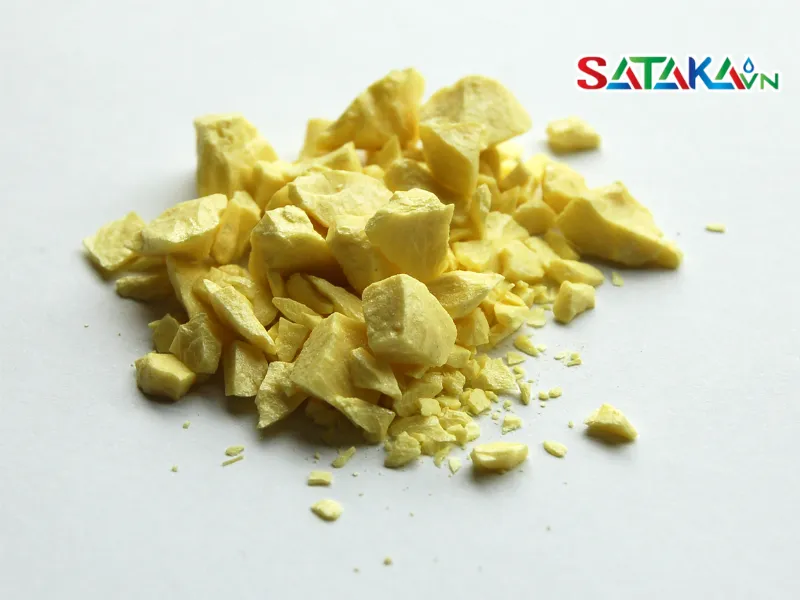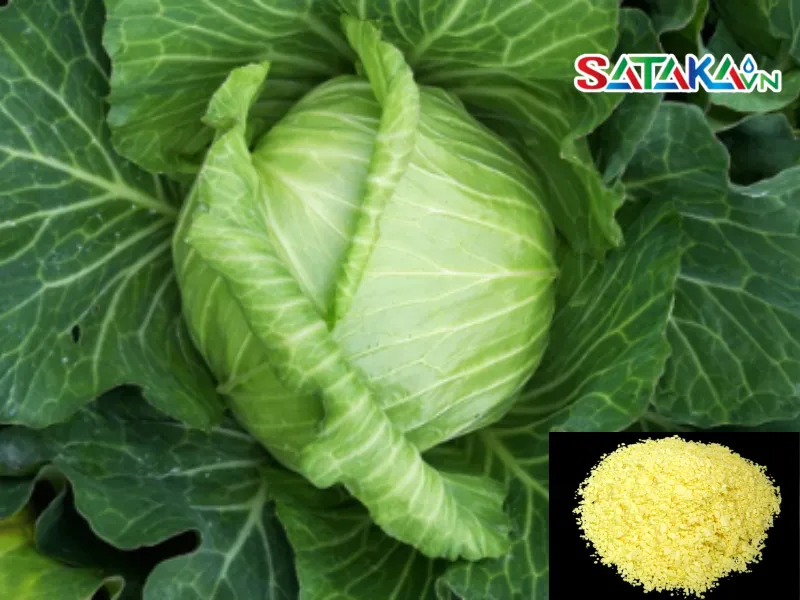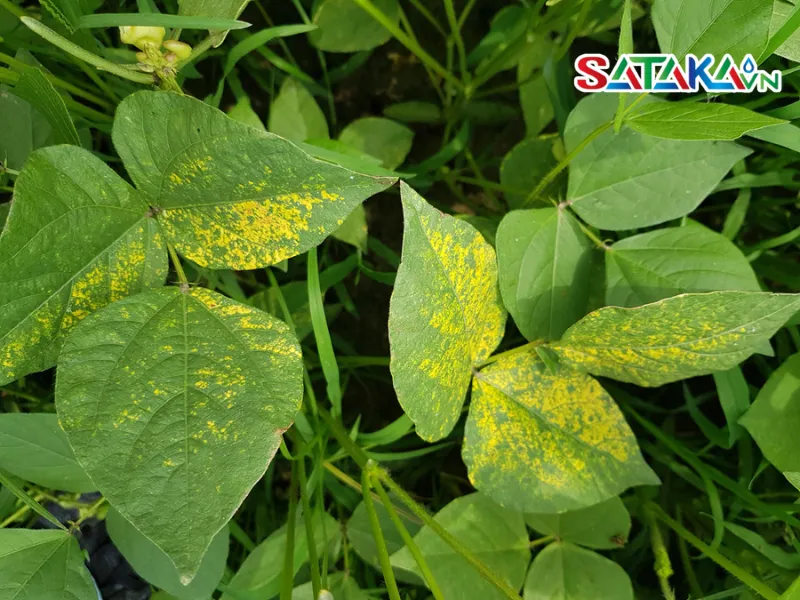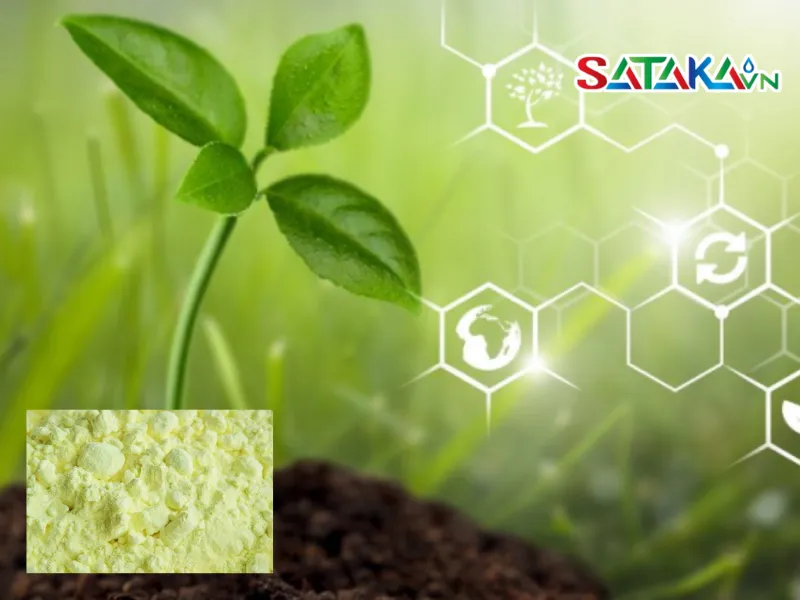Learn about sulfur - an important element that helps plants grow healthily. Discover the role, symptoms of deficiency and effective ways to supplement in the article below.
Sulfur In Agriculture
Sulfur (S) is an essential element in plant nutrition, playing a crucial role in the growth and health of crops. Understanding the role of sulfur in agriculture and the signs of deficiency will help you better manage and care for your plants. In this article, Sataka explores the importance of sulfur, the symptoms of deficiency, and how to supplement it properly to achieve the best results for your crops.
1. Why is Sulfur Important for Crops?
Sulfur is an essential element in plant nutrition that many may overlook. It is a vital mineral that plays a decisive role in the development and health of crops.
First, sulfur helps plants produce key organic compounds such as amino acids and proteins, which are necessary for growth and cell production. These compounds not only support plant growth but also contribute to higher crop yields.

Yellow is the color of the active ingredient sulfur
Additionally, sulfur plays a critical role in the photosynthesis process. Photosynthesis allows plants to convert sunlight into energy, and sulfur enhances this process by aiding the formation of essential enzymes needed for photosynthesis.
Sulfur is not only vital for physiological processes in plants but also a key component of many compounds essential for their growth. Below are specific roles of sulfur (S) in forming these important compounds:
- Component of Essential Amino Acids: Sulfur (S) is a main component of essential amino acids like methionine, cysteine, and cystine. Methionine is vital for developing proteins and enzymes required for growth. Cysteine and cystine, containing sulfur, play an important role in forming and maintaining protein structure. A sulfur deficiency can lead to a shortage of these amino acids, reducing protein synthesis and affecting plant growth.
- Part of Coenzyme A: Sulfur is a critical part of coenzyme A, which is essential for cellular respiration. Coenzyme A is involved in energy metabolism, helping plants convert nutrients into the energy needed for physiological activities. Without sufficient sulfur, cellular respiration is impaired, limiting plants’ ability to efficiently utilize nutrients.
- Component of Other Organic Compounds: Sulfur is also a component of various organic compounds like vitamins, enzymes, and antioxidants, which are essential for maintaining plant health and boosting resistance to environmental stress.

3. The Role of Sulfur in Physiological Processes in Plants
Sulfur directly impacts the physiological processes of plants in several notable ways:
- Enhancing Photosynthesis: Sulfur enhances the efficiency of light energy usage by supporting the formation and activity of enzymes required for photosynthesis.
- Aiding Nitrogen Fixation: Sulfur plays an important role in nitrogen fixation, enabling plants to utilize nitrogen more effectively. Nitrogen is essential for growth, but plants may not always absorb it efficiently from the soil. Sulfur aids this process by participating in the formation of organic compounds related to nitrogen fixation, allowing plants to better utilize available nitrogen in the soil.
- Boosting Plant Resistance: Sulfur enhances plants’ resistance to diseases, drought, and harsh environmental conditions by helping produce antioxidants and other protective compounds, keeping plants healthy and resilient.
- Improving Crop Quality: Sulfur contributes to better crop quality by increasing protein, vitamin, and nutrient content in agricultural produce, thereby enhancing its nutritional value and market quality.

Sulfur helps plant leaves stay greener
4. Symptoms of Sulfur Deficiency in Crops
When plants do not receive sufficient sulfur, they exhibit clear symptoms of deficiency. Common signs of sulfur deficiency include:
- Stunted Growth and Poor Development: One of the earliest signs of sulfur deficiency is stunted growth. Sulfur is essential for forming amino acids and proteins that give plants the strength to grow. Without sufficient sulfur, plants cannot effectively synthesize these compounds, resulting in slow and weak growth.
- Yellowing Leaves and Premature Leaf Drop: Sulfur deficiency causes yellowing leaves and early leaf drop. Sulfur is necessary to maintain the green color of leaves through photosynthesis. When sulfur is lacking, leaves cannot produce enough chlorophyll, leading to yellowing and early leaf fall.
- Reduced Yield and Quality: Crops deficient in sulfur often exhibit lower yields and poorer quality. Sulfur deficiency hampers the synthesis of proteins and nutrients in fruits and seeds, resulting in lower-quality and less bountiful harvests.
- Increased Susceptibility to Diseases: Sulfur deficiency weakens plants' immunity, making them more susceptible to diseases. Sulfur supports the production of antioxidants and protective compounds, which help plants stay healthy and defend against pathogens. Without enough sulfur, plants’ defense mechanisms are compromised, increasing disease risks.

Symptoms of Sulfur deficiency in plants cause yellowing leaves
5. How to Effectively Supplement Sulfur for Crops
To ensure your crops receive adequate sulfur and address deficiency symptoms, you can apply several effective supplementation methods. Below are common and effective ways to supplement sulfur for crops:
- Using Sulfur-Containing Fertilizers: One of the most effective ways to supplement sulfur is through fertilizers containing sulfur. Fertilizers like superphosphate, potassium sulfate, and gypsum contain the necessary amount of sulfur for crops. Superphosphate provides both phosphorus and sulfur, improving plant health and root development. Potassium sulfate provides both potassium and sulfur, supporting photosynthesis and enhancing plant resistance. Gypsum is also an effective sulfur source while improving soil structure.
- Foliar Application of Sulfur: Another method to supplement sulfur is through foliar application, where a sulfur-containing solution is sprayed on the leaves. This is a quick and effective way to provide sulfur directly to plants, especially in urgent cases. Foliar sprays may include sulfur-containing leaf fertilizers that plants can rapidly absorb to correct deficiencies.
- Managing Water Irrigation: Proper water management is crucial for plants to absorb sulfur effectively. Maintaining appropriate soil moisture ensures that sulfur in fertilizers or the soil dissolves and becomes available to plants. Regular watering, while avoiding waterlogging or drought, helps plants remain healthy and optimizes sulfur utilization.

Providing sufficient sulfur to crops not only enhances their health and productivity but also improves the quality of agricultural produce. We hope the information about the role, deficiency symptoms, and effective supplementation methods for sulfur will help you care for your crops better. Don’t forget to check and adjust sulfur levels to ensure your plants remain healthy and grow optimally!




